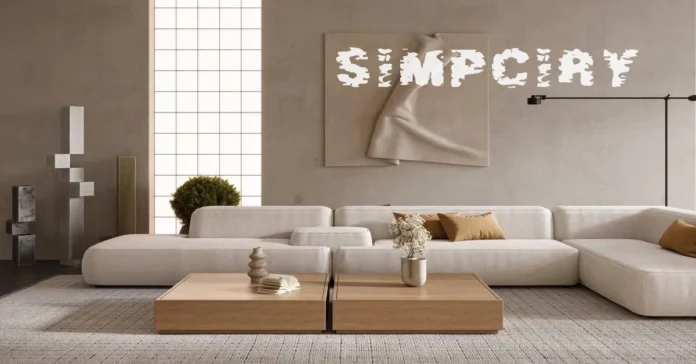In a world overflowing with distractions and endless to-do lists, the concept of minimalism is gaining traction. Imagine simplifying your life by focusing on what truly matters, while letting go of unnecessary clutter—both physical and mental. This approach, often referred to as “Simpciry,” isn’t just about decluttering your home; it’s a transformative lifestyle that can have profound effects on your mental health.
Think about it: how often do you feel overwhelmed by choices or burdened by possessions? Embracing a minimalist mindset offers an opportunity for clarity and peace of mind. As we explore this intriguing journey toward simplicity, you’ll discover not only the benefits for your emotional well-being but also practical strategies for incorporating Simpciry into various aspects of your life. Let’s dive in and see how adopting minimalism might be the key to unlocking a more fulfilling existence.
What is Minimalism and Simplicity?
Minimalism is more than just a design aesthetic; it’s a lifestyle choice that emphasizes intentionality. At its core, minimalism encourages individuals to prioritize quality over quantity. It invites you to evaluate what truly adds value to your life.
Simplicity goes hand in hand with minimalism. It revolves around stripping away the excess—whether it’s physical belongings or mental clutter—to create space for what genuinely matters. This practice fosters clarity and purpose, allowing you to focus on experiences rather than possessions.
Both concepts promote mindfulness and encourage living with intention. By reducing distractions, you can cultivate deeper connections with yourself and others. Embracing minimalism and simplicity paves the way for a life rich in fulfillment rather than chaos.
The Connection Between Minimalism and Mental Health
The impact of minimalism on mental health is profound. Reducing clutter in our physical environment translates to a clearer mind. When distractions are minimized, we can focus better on what truly matters.
Living simply encourages mindfulness. It fosters an awareness of our thoughts and emotions, allowing us to process feelings without being overwhelmed by excess stimuli. This clarity often leads to reduced anxiety levels.
Moreover, embracing minimalism helps cultivate gratitude. By letting go of the unnecessary, we begin valuing experiences over possessions. This shift transforms how we perceive happiness and fulfillment.
Another aspect is enhanced decision-making abilities. With fewer choices to navigate daily, stress decreases significantly. A minimalist lifestyle streamlines decisions and alleviates the burden many feel when faced with too many options.
Adopting simplicity creates space—both physically and mentally—for personal growth and emotional resilience.
Financial Benefits of Adopting a Minimalist Lifestyle
Adopting a minimalist lifestyle can lead to significant financial freedom. When you prioritize simplicity, your spending habits naturally shift. You buy less stuff that doesn’t add value to your life. This means fewer expenses piling up.
Many minimalists focus on experiences rather than possessions. Investing in travel or hobbies often brings more joy than material items ever could. By letting go of unnecessary purchases, you create room for meaningful investments.
Additionally, decluttering allows you to sell unused items. Those old clothes and gadgets can turn into extra cash when sold online or at garage sales.
With fewer distractions from advertising and consumer culture, you’ll find it easier to save money each month. The pressure to keep up with trends fades away as well, freeing you from the cycle of debt that comes with overconsumption.
Embracing simplicity opens doors to smarter financial choices and a healthier relationship with money.
Practical Tips for Simplifying Your Life
Start small. Choose one area of your life to simplify, like your closet or workspace. Declutter items that no longer serve you. This creates a sense of freedom.
Create routines. Establish daily habits that prioritize simplicity. A morning routine can set a calming tone for the rest of the day, reducing chaos.
Limit distractions. Identify things that pull your focus away from what matters most. Whether it’s notifications on your phone or cluttered countertops, minimizing these will enhance clarity.
Say no more often. Protecting your time is crucial for mental well-being. Be selective about commitments and only engage in activities aligned with your values.
Practice digital minimalism. Unsubscribe from emails and unfollow accounts that don’t add value to your life. Curate an online experience that’s enriching instead of overwhelming.
Engage in mindfulness exercises regularly to appreciate moments without distraction, allowing space for tranquility in everyday tasks.
How to Overcome Common Challenges of Minimalism
Embracing minimalism can be challenging, but with the right mindset, you can navigate these hurdles. One common obstacle is letting go of sentimental items. Consider taking photos instead. This way, you preserve memories without clutter.
Another challenge is feeling overwhelmed by significant decluttering projects. Tackle one area at a time to make it manageable. Setting small goals helps create momentum and keeps frustration at bay.
Social pressures often arise when friends or family don’t share your minimalist values. Surround yourself with like-minded individuals online or in local groups for support and inspiration.
Remember that minimalism isn’t about depriving yourself; it’s about making intentional choices. Reframe your thinking around possessions as tools for enhancing life rather than distractions from it. Embrace this journey towards simplicity; each step counts toward achieving mental clarity and peace.
Incorporating Simplicity into Different Aspects of Life (Home, Work, Relationships)
Simplicity can transform various areas of your life. Start at home; declutter spaces by keeping only what you truly need and love. This creates a calming environment that promotes relaxation.
At work, streamline tasks to enhance productivity. Use digital tools to organize projects and minimize distractions. A tidy workspace fuels creativity and focus.
Relationships also benefit from simplicity. Communicate openly with loved ones about your needs and boundaries. Quality over quantity matters; invest time in meaningful interactions rather than superficial connections.
Consider simplifying commitments as well. Say no more often to avoid overwhelming yourself with obligations that don’t align with your values or goals. Prioritize what brings you joy.
Embracing simplicity across these various aspects fosters clarity and peace of mind while enhancing overall well-being.
Conclusion: The Positive Impact of Minimalism on Mental Health and Overall Well-being
Embracing minimalism, or as some might call it “simpciry,” can lead to profound changes in mental health and overall well-being. By focusing on what truly matters and letting go of excess clutter—both physical and emotional—we create space for clarity and peace. This lifestyle choice often reduces stress levels, enhances focus, and brings a sense of purpose.
The benefits extend beyond just personal satisfaction; adopting a minimalist approach also promotes healthier relationships by encouraging more meaningful connections rather than materialistic pursuits. As individuals simplify their environments, they may find increased happiness in experiences rather than possessions.
The journey toward minimalism isn’t just about decluttering your home—it’s about fostering a mindset that prioritizes tranquility over chaos. The positive effects ripple through various facets of life, leading to improved emotional resilience and an enriched quality of life. Embracing simpciry could very well be the key to unlocking your true potential while nurturing your mental well-being.




